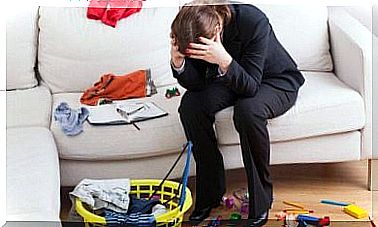It Is Important To Talk To Your Baby – What The Baby Hears Leaves Traces In Its Brain

A baby is the most receptive creature in the world. Everyone needs stimulation, affection, caresses, and most importantly, words. What’s more, everything it hears will leave an indelible mark on its brain. Hence, we should be those wonderful architects of this love. A love that is understood through our tone and that is guided by the warmth of the voice that envelops and stimulates. Here we answer the question: How important is it to talk to babies ?
Anyone who thinks it is nonsense to speak to a newborn is wrong. Failure to do so even contributes to deficits that slow down the child’s communication process. We have to talk to babies, talk to them a lot, listen to them, whisper something to them, tell them stories etc … Although they cannot yet decipher the words, they are experienced translators of emotions and little pioneers of the language process.
Day after day and month after month, certain words gain meaning until, almost without knowing how, they understand them as sentences. And then start communicating things yourself in their own language. This fantastic process must take place in a favorable, loving, and sheltered environment.
Because even if we don’t speak to the newborn , everything that he hears is recorded in his brain. And his brain will evolve based on this continuous interrelation of hearing. So don’t stop talking to your child. If you’re one of those fathers or mothers who never stop talking to their baby, your kid is one of the lucky ones.
We explain why.
The routines – ideal moments to talk to your baby

We are aware that a newborn baby sleeps most of the time. But even during these first weeks and months we have wonderful moments to initiate this magical process with which we can stimulate the child’s brain development through language.
- Breastfeeding is undoubtedly the most beneficial, magical, and meaningful time to talk to a baby.
- Make sure that the tone of your voice is warm, positive, and always has positive intonation.
- Pay attention to eye contact when changing diapers and when putting on and taking off.
- The moments of bathing are relaxed moments when the babies are very receptive to both the voices and the gestures of mom and dad.
- If we manage to evoke a smile, we will have left positivity and love in the child’s brain.
Mom’s voice guides the baby
Mom’s voice is wonderful and has always been there long before the baby was born. The child spent 9 months in the womb of the woman, who now rocks and feeds it.
- At birth, a baby already recognizes its mother’s voice. We shouldn’t forget that the amniotic fluid conducts sound very well. Once the fetus develops its sense of hearing, it is mom’s voice that accompanies it day in and day out.
- A baby doesn’t yet understand the words, but as we mentioned at the beginning, they understand the intent and semantics that are in each sentence.
- This is why the baby listens to us, laughs, or is occasionally scared when we speak in a louder voice.
Wonderful mothers and extraordinary fathers raise with affection and leave traces of love in their children’s brains
Words must be accompanied by gestures

Communication with a baby should be enhanced using gestures and an appropriate tone of voice. In this way we consolidate the verbal language with the non-verbal and encourage positive emotions.
- Don’t forget to smile while you talk to him, and always try to make eye contact.
- Make sure to also take small breaks when talking to your baby. Wait for them to respond, wait for a sound, or for them to open their eyes wider, squeak a bit, or smile at you. In this way we also show them the usual communication pattern.
We should also not forget to support the communicative process of our children. A baby also makes gestures, grimaces, and noises. We can support this process by mimicking their gestures and sounds. So that they see that we understand them and that everything they do and say is important and valuable.
The “baby talk”: we all do it without even realizing it
The way an adult speaks to a baby is called ” baby talk “. This English word defines something that most mothers and fathers do every day.
- No adult speaks to a baby as they would speak to an adult. Our brains know how to interact with a young child to stimulate their communication process.
- We must remember that language is the genetic trait that sets us apart from other primates. That is why we instinctively know how to stimulate early communication in our children.
- We speak to them in a high voice to get their attention.
- We also make noises that stimulate new sensations in them: laughter, giggles, squeaks.
- Nobody taught us to say things like “there, there, there …” , we do it instinctively. These verbalizations are not useful, but they are meaningful: they calm the baby.

You have endless reasons to communicate with your baby from birth. From the first moment after the birth, when you hold it to your chest, it needs you. And it also takes you to learn how to communicate.
So keep in mind that all of those first words will leave a mark on his brain. They will be the basis for your baby to learn to speak and understand the world. Babies do this through the warm voice of their parents who always shows them their infinite affection.









